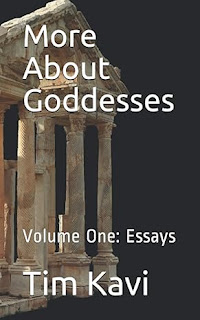MORE ABOUT GODDESSES: The Afro-Brazilian Goddess Yemanjá: Queen of the Ocean. (New Essay)
by Tim Kavi
Yemanjá, also known as Lemanjá, revered Afro-Brazilian goddess in Candomblé and Umbanda, embodies the profound power and mystery of the ocean. Celebrated as a nurturing mother, fierce protector, and source of life, her immense presence in Brazilian culture is undeniable. Her story, rich with transatlantic history and spiritual evolution, positions her not only as a divine entity but also as a powerful archetype reflecting universal human experiences.
Yemanjá originated in West Africa's Yoruba traditions as Yemọja, a powerful river deity of the Ogun River and mother of all orixás. When enslaved Africans arrived in Brazil, they carried their spiritual traditions. As the Atlantic Ocean became a symbol of the terrifying journey and new home, Yemoja's domain shifted from river to sea, transforming into Yemanjá. This syncretism linked her with Catholic figures like Our Lady of the Immaculate Conception or Our Lady of Navigators, ensuring her worship endured under the guise of the dominant religion.
As Queen of the Ocean, Yemanjá is typically depicted with flowing blue or white garments, adorned with pearls, shells, and marine treasures. She has also been seen as a mermaid. Her symbolism is rich: mother of all, source of life, fertility, and abundance. She governs literal waters and humanity's emotional depths. Devotees turn to her for protection, particularly for sailors and fishermen, for guidance in family and motherhood, and for cleansing and purification. Her gentle yet formidable nature represents the ocean itself – calm and nurturing one moment, tempestuous and unyielding the next. She epitomizes unconditional love, patience, and ancient aquatic wisdom.
Yemanjá's worship is vibrant and public, especially in Brazil's coastal cities. On New Year's Eve (December 31st) and February 2nd, millions gather by the sea to honor her. Offerings of white flowers, perfumes, candles, and small gifts are cast into the waves, accompanied by prayers for blessings, health, and prosperity for the coming year. These communal rituals reinforce the deep connection between people, ocean, and her divine feminine power.
Beyond deity, Yemanjá functions as a powerful Jungian archetype, representing universal psychic patterns. Features of said archetype:
The Great Mother Archetype: She embodies the ultimate nurturing, protective, and life-giving force. Like the ocean, she is the primordial source from which all life springs, offering unconditional love and sustenance. This resonates with the human need for a secure, benevolent origin.
The Collective Unconscious: The vast, unfathomable depths of the ocean mirror the collective unconscious – the repository of shared human experiences, instincts, and universal symbols. Yemanjá, as its ruler, offers access to deep wisdom, intuition, and the primordial self.
Transformation and Rebirth: The ocean's constant ebb and flow, its capacity to cleanse and renew, reflects psychological transformation. Yemanjá aids in shedding the old and embracing new beginnings, symbolizing emotional purification and spiritual rebirth.
Resilience and Adaptation: Her transformation from river goddess to ocean deity, and syncretism with Catholic saints, exemplifies cultural resilience and the adaptive power of belief systems in the face of adversity. This echoes human capacity to adapt and find meaning in challenges.
Yemanjá, Queen of the Sea, is more than myth; she is a living symbol of maternity, strength, and life's enduring power. Her journey from Africa's rivers to Brazil's oceans encapsulates a profound history of survival and adaptation. As an archetype, she continues to provide comfort, inspiration, and a deep connection to nature's primal forces and the human spirit, reminding us of our origins and the boundless capacity for renewal.~~TK














.jpg)











